Sony CDX-GT517EE User Manual
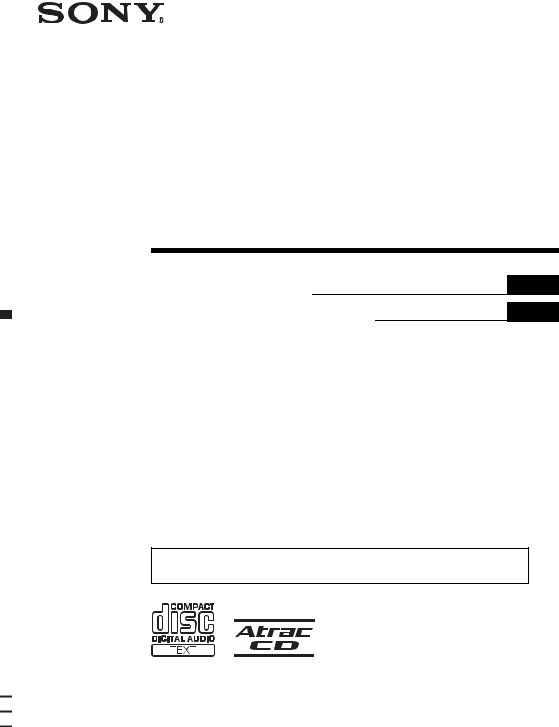
2-698-276-32 (1)
FM/MW/LW
Compact Disc Player
Operating Instructions
Инструкция по эксплуатации
GB
RU
To cancel the demonstration (DEMO) display, see page 11.
Для отмены демонстрации на дисплее (режим DEMO) см. стр. 13.
CDX-GT517EE
© 2006 Sony Corporation

For installation and connections, see the supplied installation/connections manual.
Warning if your car’s ignition has no ACC position
Be sure to set the Auto Off function (page 11). The unit will shut off completely and automatically in the set time after the unit is turned off, which prevents battery drain.
If you do not set the Auto Off function, press and hold (OFF) until the display disappears each time you turn the ignition off.
This label is located on the bottom of the chassis.
Disposal of Old Electrical & Electronic Equipment (Applicable in the European Union and other European countries with separate collection systems)
This symbol on the product or on its packaging indicates that this product shall not be treated as household waste. Instead it shall be handed over to the applicable collection point for the recycling of electrical and electronic equipment. By ensuring this product is disposed of correctly, you will help prevent potential negative consequences for the environment and human health, which could otherwise be caused by inappropriate waste handling of this product. The recycling of materials will help to conserve natural resources. For more detailed information about recycling of this product, please contact your local Civic Office, your household waste disposal service or the shop where you purchased the product.
Applicable accessory: Remote commander
SonicStage and its logo are trademarks of Sony Corporation.
“ATRAC” and its logo are trademarks of Sony Corporation.
Microsoft, Windows Media, and the Windows logo are
trademarks or registered trademarks of Microsoft
Corporation in the United States and/or other countries.
2

Table of Contents
Welcome ! . . . . . . . . . . . . . . . . . . . . . . . . . . . . . 4
Getting Started
Resetting the unit. . . . . . . . . . . . . . . . . . . . . . . . 4 Preparing the card remote commander . . . . . . . 4 Setting the clock . . . . . . . . . . . . . . . . . . . . . . . . 4 Detaching the front panel . . . . . . . . . . . . . . . . . 5 Attaching the front panel . . . . . . . . . . . . . . . 5 Inserting the disc in the unit . . . . . . . . . . . . . . . 5 Ejecting the disc . . . . . . . . . . . . . . . . . . . . . . 5
Location of controls and basic operations
Main unit. . . . . . . . . . . . . . . . . . . . . . . . . . . . 6 Card remote commander RM-X151 . . . . . . . 6
CD
Display items . . . . . . . . . . . . . . . . . . . . . . . . 8 Repeat and shuffle play. . . . . . . . . . . . . . . . . 8
Radio
Storing and receiving stations . . . . . . . . . . . . . . 8 Storing automatically — BTM . . . . . . . . . . . 8 Storing manually. . . . . . . . . . . . . . . . . . . . . . 8 Receiving the stored stations . . . . . . . . . . . . 8 Tuning automatically . . . . . . . . . . . . . . . . . . 8
RDS . . . . . . . . . . . . . . . . . . . . . . . . . . . . . . . . . . 9 Overview. . . . . . . . . . . . . . . . . . . . . . . . . . . . 9 Setting AF and TA . . . . . . . . . . . . . . . . . . . . 9 Selecting PTY . . . . . . . . . . . . . . . . . . . . . . . 10 Setting CT . . . . . . . . . . . . . . . . . . . . . . . . . . 10
Other functions
Changing the sound settings . . . . . . . . . . . . . . 11 Adjusting the sound characteristics
— BAL/FAD/SUB. . . . . . . . . . . . . . . . . . . 11 Customizing the equalizer curve
— EQ3 . . . . . . . . . . . . . . . . . . . . . . . . . . . . 11 Adjusting setup items — SET . . . . . . . . . . . . 11 Using optional equipment. . . . . . . . . . . . . . . . 12 Auxiliary audio equipment. . . . . . . . . . . . . 12 CD/MD changer . . . . . . . . . . . . . . . . . . . . . 12 Rotary commander RM-X4S . . . . . . . . . . . 13
Additional Information
Precautions . . . . . . . . . . . . . . . . . . . . . . . . . . . 14 Notes on discs . . . . . . . . . . . . . . . . . . . . . . 14 Playback order of MP3/WMA/
AAC files . . . . . . . . . . . . . . . . . . . . . . . . . . 15 About MP3 files . . . . . . . . . . . . . . . . . . . . . 15 About WMA files. . . . . . . . . . . . . . . . . . . . 15 About AAC files . . . . . . . . . . . . . . . . . . . . 15 About ATRAC CD. . . . . . . . . . . . . . . . . . . 15
Maintenance . . . . . . . . . . . . . . . . . . . . . . . . . . 16 Removing the unit. . . . . . . . . . . . . . . . . . . . . . 16 Specifications . . . . . . . . . . . . . . . . . . . . . . . . . 17 Troubleshooting . . . . . . . . . . . . . . . . . . . . . . . 18 Error displays/Messages. . . . . . . . . . . . . . . 19
3
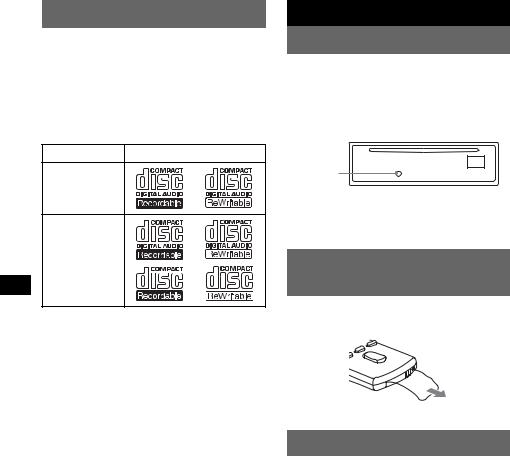
Welcome !
Thank you for purchasing this Sony Compact Disc Player. You can enjoy your drive with the following functions.
•CD playback
You can play CD-DA (also containing CD TEXT*), CD-R/CD-RW (MP3/WMA/AAC files also containing Multi Session (page 14)) and ATRAC CD (ATRAC3 and ATRAC3plus format (page 15)).
Type of discs |
Label on the disc |
CD-DA
MP3
WMA
AAC
ATRAC CD
•Radio reception
–You can store up to 6 stations per band (FM1, FM2, FM3, MW and LW).
–BTM (Best Tuning Memory): The unit selects strong signal stations and stores them.
•RDS services
–You can use FM station with Radio Data System (RDS).
•Sound adjustment
–EQ3 stage2: You can choose any one of 7 preset equalizer curves.
–DSO (Dynamic Soundstage Organizer): Creates a more ambient sound field, using virtual speaker synthesis, to enhance the sound of speakers, even if they are installed low in the door.
•Optional unit operation
You can also control optional CD/MD changers.
•Auxiliary equipment connection
An AUX input jack on the front of the unit allows connection of a portable audio device.
*A CD TEXT disc is a CD-DA that includes information such as disc, artist and track name.
Getting Started
Resetting the unit
Before operating the unit for the first time, or after replacing the car battery or changing the connections, you must reset the unit.
Detach the front panel and press the RESET button with a pointed object, such as a ball-point pen.
RESET button
Note
Pressing the RESET button will erase the clock setting and some stored contents.
Preparing the card remote commander
Before using the card remote commander for the first time, remove the insulation film.
Setting the clock
The clock uses a 24-hour digital indication.
1Press and hold the select button.
The setup display appears.
2Press the select button repeatedly until “CLOCK-ADJ” appears.
3Press (SEEK) +.
The hour indication flashes.
4Rotate the volume control dial to set the hour and minute.
To move the digital indication, press (SEEK) –/+.
5Press the select button.
The setup is complete and the clock starts.
To display the clock, press (DSPL). Press (DSPL) again to return to the previous display.
With the card remote commander
In step 4, to set the hour and minute, press M or m.
4
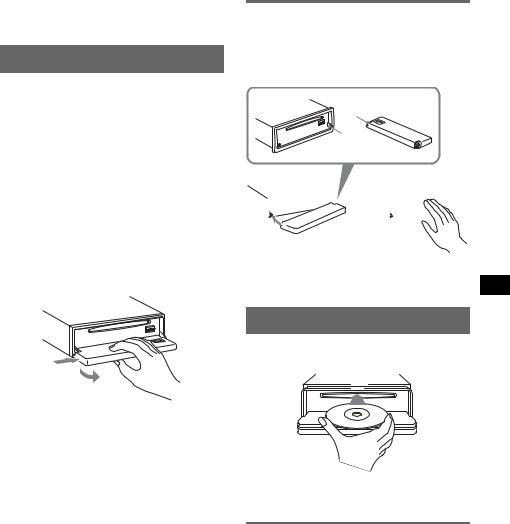
Tip
You can set the clock automatically with the RDS feature (page 10).
Detaching the front panel
You can detach the front panel of this unit to prevent theft.
Caution alarm
If you turn the ignition switch to the OFF position without detaching the front panel, the caution alarm will sound for a few seconds. The alarm will only sound if the built-in amplifier is used.
1Press (OFF).
The unit is turned off.
2Press (OPEN).
The front panel is flipped down.
3Slide the front panel to the right, then gently pull out the left end of the front panel.
Attaching the front panel
Place the hole A of the front panel onto the spindle B on the unit, then lightly push the left side in.
Press (SOURCE) on the unit (or insert a disc) to operate the unit.
A
B |
 c
c 
Note
Do not put anything on the inner surface of the front panel.
Inserting the disc in the unit
|
1 |
Press (OPEN). |
1 |
2 |
Insert the disc (label side up). |
|
2 |
|
Notes
•Do not drop or put excessive pressure on the front panel and display window.
•Do not subject the front panel to heat/high temperature or moisture. Avoid leaving it in a parked car or on a dashboard/rear tray.
3 Close the front panel.
Playback starts automatically.
Ejecting the disc
1 Press (OPEN).
2 Press Z.
The disc is ejected.
3 Close the front panel.
5
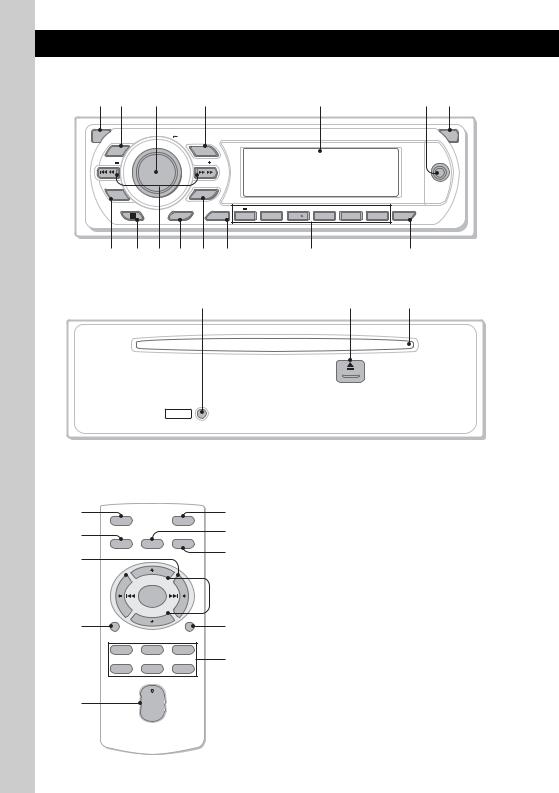
Location of controls and basic operations
Main unit
12 3 |
4 |
5 |
6 7 |
OFF |
PUSH SELECT |
|
OPEN |
DSO |
SOURCE |
SEEK |
AUX |
SEEK |
|
EQ3 |
MODE |
|
|
|
GP/ALBM |
REP |
SHUF |
|
PAUSE |
|
PTY |
DSPL |
1 |
2 |
3 |
4 |
5 |
6 |
AF/TA |
CDX-GT517EE
8 9q;qaqs qd |
qf |
qg |
Front panel removed
qh |
qj |
qk |
RESET
Card remote commander |
|
Refer to the pages listed for details. The |
||||
RM-X151 |
|
|
|
corresponding buttons on the card remote |
||
|
|
|
commander control the same functions as those |
|||
|
|
|
|
|
||
1 |
|
|
|
wa |
on the unit. |
|
|
|
|
A OFF button |
|||
OFF |
ATT |
ws |
||||
|
||||||
4 |
|
|
|
To power off; stop the source. |
||
|
MODE |
|
||||
SOURCE SEL |
qs |
B DSO button 4 |
||||
ql |
|
|
|
|||
|
|
|
|
To select the DSO mode (1, 2, 3 or OFF). |
||
|
|
|
|
|
||
|
+ |
|
|
|
The larger the number, the more enhanced |
|
|
|
|
|
wd |
the effect. |
|
|
|
|
|
|
||
–C Volume control dial/select button 11
qd |
DSPL |
|
SCRL |
wf |
To adjust volume (rotate); select setup items |
|
|
|
|
|
(press and rotate). |
|
1 |
2 |
3 |
wg |
D SOURCE button |
|
|
|
|
||
|
4 |
5 |
6 |
To power on; change the source (Radio/CD/ |
|
|
|
||||
|
|
|
|
|
MD*1/AUX). |
w; |
|
+ |
|
|
E Display window |
|
VOL |
|
|
|
|
|
|
– |
|
|
F AUX input jack 12 |
|
|
|
|
|
|
|
|
|
|
|
To connect a portable audio device. |
6 |
|
|
|
|
G OPEN button 5 |
|
|
|
|
|

HEQ3 (equalizer) button 11
To select an equalizer type (XPLOD, VOCAL, EDGE, CRUISE, SPACE, GRAVITY, CUSTOM or OFF).
IReceptor for the card remote commander
JSEEK –/+ buttons
CD:
To skip tracks (press); skip tracks continuously (press, then press again within about 1 second and hold); reverse/fastforward a track (press and hold).
Radio:
To tune in stations automatically (press); find a station manually (press and hold).
KPTY (Program Type) button 10
To select PTY in RDS.
LMODE button 8, 12
To select the radio band (FM/MW/LW); select the unit*2.
MDSPL (display) button 8, 9
To change display items.
NNumber buttons
CD/MD*1:
(1)/(2): GP*3/ALBM*4 –/+
To skip albums (press); skip albums continuously (press and hold).*5
(3): REP 8, 13
(4): SHUF 8, 13
(6): PAUSE*6
To pause playback. To cancel, press again.
Radio:
To receive stored stations (press); store stations (press and hold).
OAF (Alternative Frequencies)/TA (Traffic Announcement) button 9
To set AF and TA in RDS.
P RESET button 4
Q Z (eject) button 5
To eject the disc.
RDisc slot 5
To insert the disc.
The following buttons on the card remote commander have also different buttons/functions from the unit. Remove the insulation film before use (page 4).
ql < (.)/, (>) buttons
To control CD/radio, the same as (SEEK) –/+ on the unit.
w; VOL (volume) +/– button
To adjust volume.
wa ATT (attenuate) button
To attenuate the sound. To cancel, press again.
ws SEL (select) button
The same as the select button on the unit.
wd M (+)/m (–) buttons
To control CD, the same as (1)/(2) (GP/ALBM –/+) on the unit.
wf SCRL (scroll) button 8
To scroll the display item.
wg Number buttons
To receive stored stations (press); store stations (press and hold).
*1 When an MD changer is connected.
*2 When a CD/MD changer is connected.
*3 When an ATRAC CD is played.
*4 When an MP3/WMA/AAC is played.
*5 If the changer is connected, the operation is different, see page 13.
*6 When playing back on this unit.
Note
If the unit is turned off and the display disappears, it cannot be operated with the card remote commander unless (SOURCE) on the unit is pressed, or a disc is inserted to activate the unit first.
Tip
For details on how to replace the battery, see “Replacing the lithium battery of the card remote commander” on page 16.
7
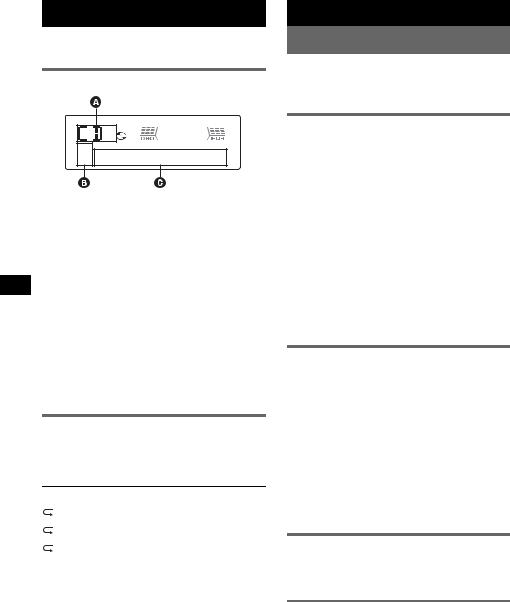
CD
For details on selecting a CD/MD changer, see page 12.
Display items
A Source
B ATRAC/WMA/MP3/AAC indication
CTrack number/Elapsed playing time, Disc/ artist name, Album/group number*, Album/ group name, Track name, Text information, Clock
*Album/group number is displayed only when the album/group is changed.
To change display items C, press (DSPL); scroll display items C, press (SCRL) on the card remote commander or set “A.SCRL-ON” (page 12).
Tip
Displayed items will differ, depending on the disc type, recorded format and settings. For details on MP3/ WMA/AAC, see page 15; ATRAC CD, see page 15.
Repeat and shuffle play
1During playback, press (3) (REP) or
(4) (SHUF) repeatedly until the desired setting appears.
Select |
To play |
TRACK |
track repeatedly. |
|
|
ALBUM*1 |
album repeatedly. |
GROUP*2 |
group repeatedly. |
SHUF ALBUM*1 |
album in random order. |
SHUF GROUP*2 |
group in random order. |
SHUF DISC |
disc in random order. |
|
|
*1 When an MP3/WMA/AAC is played.
*2 When an ATRAC CD is played.
To return to normal play mode, select “ OFF” or “SHUF OFF.”
OFF” or “SHUF OFF.”
Radio
Storing and receiving stations
Caution
When tuning in stations while driving, use Best Tuning Memory (BTM) to prevent an accident.
Storing automatically — BTM
1Press (SOURCE) repeatedly until
“TUNER” appears.
To change the band, press (MODE) repeatedly. You can select from FM1, FM2, FM3*, MW or LW.
2Press and hold the select button.
The setup display appears.
3Press the select button repeatedly until “BTM” appears.
4Press (SEEK) +.
The unit stores stations in order of frequency on the number buttons.
A beep sounds when the setting is stored.
* FM3 tuning range is 65 to 74 MHz (at 30 kHz step).
Storing manually
1While receiving the station that you want to store, press and hold a number button ((1) to (6)) until
“MEM” appears.
The number button indication appears in the display.
Note
If you try to store another station on the same number button, the previously stored station will be replaced.
Tip
When a RDS station is stored, the AF/TA setting is also stored (page 9).
Receiving the stored stations
1Select the band, then press a number button ((1) to (6)).
Tuning automatically
1Select the band, then press (SEEK) –/+ to search for the station.
Scanning stops when the unit receives a station. Repeat this procedure until the desired station is received.
8
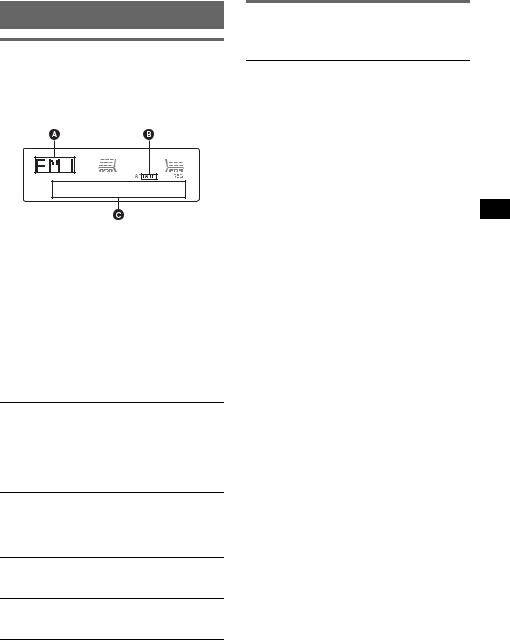
Tip
If you know the frequency of the station you want to listen to, press and hold (SEEK) –/+ to locate the approximate frequency, then press (SEEK) –/+ repeatedly to fine adjust to the desired frequency (manual tuning).
Notes
•Depending on the country/region, not all RDS functions may be available.
•RDS will not work if the signal strength is too weak, or if the station you are tuned to is not transmitting RDS data.
RDS
Overview
FM stations with Radio Data System (RDS) service send inaudible digital information along with the regular radio program signal.
Display items
A Radio band, Function
B TA/TP*1
CFrequency*2 (Program service name), Preset number, Clock, RDS data
*1 “TA” flashes during traffic information. “TP” lights up while such a station is received.
*2 While receiving the RDS station, “ *” is displayed on the left of the frequency indication.
To change display items C, press (DSPL).
RDS services
This unit automatically provides RDS services as follows:
AF (Alternative Frequencies)
Selects and retunes the station with the strongest signal in a network. By using this function, you can continuously listen to the same program during a long-distance drive without having to retune the same station manually.
TA (Traffic Announcement)/TP (Traffic Program)
Provides current traffic information/programs. Any information/program received, will interrupt the currently selected source.
PTY (Program Types)
Displays the currently received program type. Also searches your selected program type.
CT (Clock Time)
The CT data from the RDS transmission sets the clock.
Setting AF and TA
1Press (AF/TA) repeatedly until the desired setting appears.
Select |
To |
AF-ON |
activate AF and deactivate TA. |
|
|
TA-ON |
activate TA and deactivate AF. |
|
|
AF, TA-ON |
activate both AF and TA. |
|
|
AF, TA-OFF |
deactivate both AF and TA. |
|
|
Storing RDS stations with the AF and TA setting
You can preset RDS stations along with the AF/ TA setting. If you use the BTM function, only RDS stations are stored with the same AF/TA setting.
If you preset manually, you can preset both RDS and non-RDS stations with the AF/TA setting for each.
1Set AF/TA, then store the station with BTM or manually.
Presetting the volume of traffic announcements
You can preset the volume level of the traffic announcements so as to not miss hearing them.
1Rotate the volume control dial to adjust the volume level.
2Press and hold (AF/TA) until “TA” appears.
Receiving emergency announcements
With AF or TA on, the emergency announcements will automatically interrupt the currently selected source.
Staying with one regional program
— REG
When the AF function is on: this unit’s factory setting restricts reception to a specific region, so you will not be switched to another regional station with a stronger frequency.
If you leave this regional program’s reception area, set “REG-OFF” in setup during FM reception (page 12).
continue to next page t
9
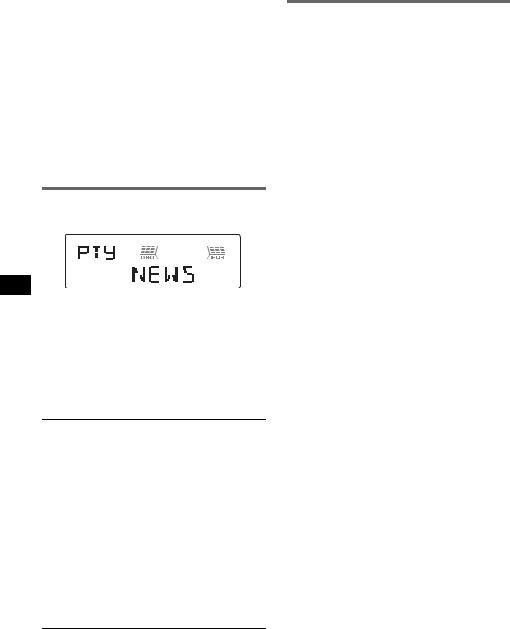
Note
This function does not work in the UK and in some other areas.
Local Link function (UK only)
This function enables you to select other local stations in the area, even if they are not stored on your number buttons.
1During FM reception, press a number button ((1) to (6)) on which a local station is stored.
2Within 5 seconds, press again a number button of the local station.
Repeat this procedure until the local station is received.
Selecting PTY
1Press (PTY) during FM reception.
The current program type name appears if the station is transmitting PTY data.
2Press (PTY) repeatedly until the desired program type appears.
3Press (SEEK) –/+.
The unit starts to search for a station broadcasting the selected program type.
Type of programs
NEWS (News), AFFAIRS (Current Affairs), INFO (Information), SPORT (Sports), EDUCATE (Education), DRAMA (Drama), CULTURE (Culture), SCIENCE (Science), VARIED (Varied), POP M (Popular Music), ROCK M (Rock Music), EASY M (Easy Listening), LIGHT M (Light Classical), CLASSICS (Classical), OTHER M (Other Music Type), WEATHER (Weather), FINANCE (Finance), CHILDREN (Children’s Programs), SOCIAL A (Social Affairs), RELIGION (Religion), PHONE IN (Phone In), TRAVEL (Travel), LEISURE (Leisure), JAZZ (Jazz Music), COUNTRY (Country Music), NATION M (National Music), OLDIES (Oldies Music), FOLK M (Folk Music), DOCUMENT (Documentary)
Note
You cannot use this function in countries/regions where no PTY data is available.
Setting CT
1 Set “CT-ON” in setup (page 11).
Notes
•The CT function may not work even though an RDS station is being received.
•There might be a difference between the time set by the CT function and the actual time.
10
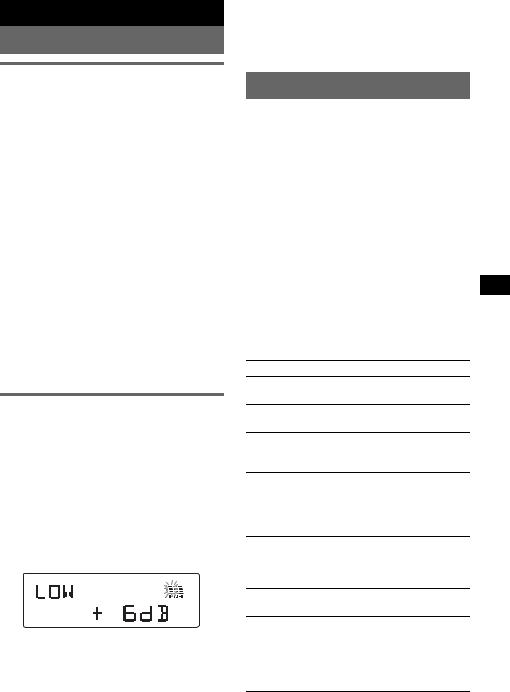
Other functions
Changing the sound settings
Adjusting the sound characteristics — BAL/FAD/SUB
You can adjust the balance, fader, and subwoofer volume.
1Press the select button repeatedly until “BAL,” “FAD” or “SUB” appears.
The item changes as follows:
LOW*1 t MID*1 t HI*1 t
BAL (left-right) t FAD (front-rear) t SUB (subwoofer volume)*2 t AUX*3
*1 When EQ3 is activated (page 11).
*2 When the audio output is set to “SUB” (page 11).
“ATT” is displayed at the lowest setting, and can be adjusted up to 20 steps.
*3 When AUX source is activated (page 12).
2Rotate the volume control dial to adjust the selected item.
After 3 seconds, the setting is complete and the display returns to normal play/reception mode.
With the card remote commander
In step 2, to adjust the selected item, press <, M, , or m.
Customizing the equalizer curve
— EQ3
“CUSTOM” of EQ3 allows you to make your own equalizer settings.
1Select a source, then press (EQ3) repeatedly to select “CUSTOM.”
2Press the select button repeatedly until “LOW,” “MID” or “HI” appears.
3Rotate the volume control dial to adjust the selected item.
The volume level is adjustable in 1 dB steps, from –10 dB to +10 dB.
Repeat steps 2 and 3 to adjust the equalizer curve.
To restore the factory-set equalizer curve, press and hold the select button before the setting is complete.
After 3 seconds, the setting is complete and the display returns to normal play/reception mode.
Tip
Other equalizer types are also adjustable.
With the card remote commander
In step 3, to adjust the selected item, press <, M, , or m.
Adjusting setup items — SET
1Press and hold the select button.
The setup display appears.
2Press the select button repeatedly until the desired item appears.
3Rotate the volume control dial to select the setting (example “ON” or “OFF”).
4Press and hold the select button.
The setup is complete and the display returns to normal play/reception mode.
Note
Displayed items will differ, depending on the source and setting.
With the card remote commander
In step 3, to select the setting, press < or ,.
The following items can be set (follow the page reference for details):
“z” indicates the default settings.
CLOCK-ADJ (Clock Adjust) (page 4)
CT (Clock Time)
To set “CT-ON” or “CT-OFF” (z) (page 9, 10).
BEEP
To set “BEEP-ON” (z) or “BEEP-OFF.”
AUX-A*1 (AUX Audio)
To turn the AUX source display “AUX-A-ON” (z) or “AUX-A-OFF” (page 12).
A.OFF (Auto Off)
To shut off automatically after a desired time when the unit is turned off: “A.OFF-NO” (z), “A.OFF-30S (Seconds),” “A.OFF-30M (Minutes)” or “A.OFF-60M (Minutes).”
SUB/REAR*1
To switch the audio output.
–“SUB-OUT” (z): to output to a subwoofer.
–“REAR-OUT”: to output to a power amplifier.
DEMO*1 (Demonstration)
To set “DEMO-ON” (z) or “DEMO-OFF.”
DIM (Dimmer)
To change the brightness of the display.
–“DIM-AT” (z): to dim the display automatically when you turn lights on.
–“DIM-ON”: to dim the display.
–“DIM-OFF”: to deactivate the dimmer.
continue to next page t
11
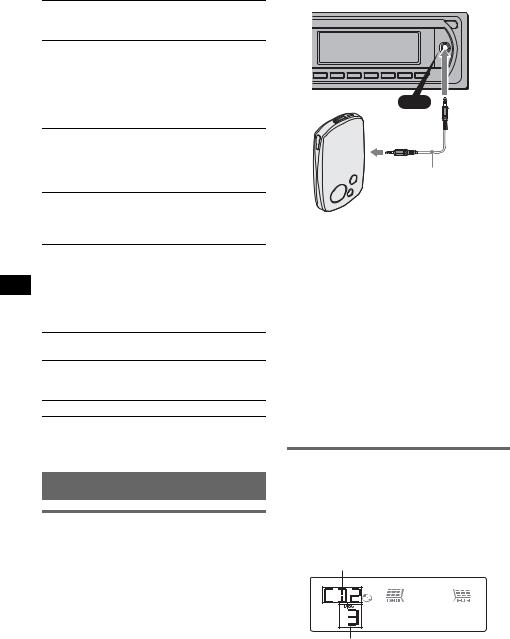
ILM (Illumination)
To change the illumination color: “ILM-1” (z) or “ILM-2.”
M.DSPL (Motion Display)
To select the Motion Display mode.
–“M.DSPL-SA” (z): to show moving patterns and spectrum analyzer.
–“M.DSPL-ON”: to show moving patterns.
–“M.DSPL-OFF”: to deactivate the Motion Display.
A.SCRL (Auto Scroll)
To scroll long displayed item automatically when the disc/album/group/track is changed.
–“A.SCRL-ON” (z): to scroll.
–“A.SCRL-OFF”: to not scroll.
LOCAL (Local seek mode)
–“LOCAL-OFF” (z): to tune normal reception.
–“LOCAL-ON” : to only tune into stations with stronger signals.
MONO (Monaural mode)*2
To improve poor FM reception, select monaural reception mode.
–“MONO-OFF” (z): to hear stereo broadcast in stereo.
–“MONO-ON”: to hear stereo broadcast in monaural.
REG*2 (Regional)
To set “REG-ON” or “REG-OFF” (z) (page 9).
LPF*3 (Low Pass Filter)
To select the subwoofer cut-off frequency: “LPF OFF” (z), “LPF125Hz” or “LPF 78Hz.”
BTM (page 8)
*1 When the unit is turned off.
*2 When FM is received.
*3 When the audio output is set to “SUB.”
Using optional equipment
Auxiliary audio equipment
By connecting an optional portable audio device to the AUX input jack (stereo mini jack) on the unit and then simply selecting the source, you can listen on your car speakers. The volume level is adjustable for any difference between the unit and the portable audio device. Follow the procedure below:
Connecting the portable audio device
1Turn off the portable audio device.
2Turn down the volume on the unit.
3Connect to the unit.
AUX
AUX
Connecting cord*
(not supplied)
* Be sure to use a straight type plug.
Adjust the volume level
Be sure to adjust the volume for each connected audio device before playback.
1Turn down the volume on the unit.
2Press (SOURCE) repeatedly until “AUX” appears.
“AUX FRONT IN” appears.
3Start playback of the portable audio device at a moderate volume.
4Set your usual listening volume on the unit.
5Press the select button repeatedly until “AUX” appears, and rotate the volume control dial to adjust the input level (–8 dB to +18 dB).
CD/MD changer
Selecting the changer
1Press (SOURCE) repeatedly until “CD” or “MD” appears.
2Press (MODE) repeatedly until the desired changer appears.
Unit number
Disc number
Playback starts.
12
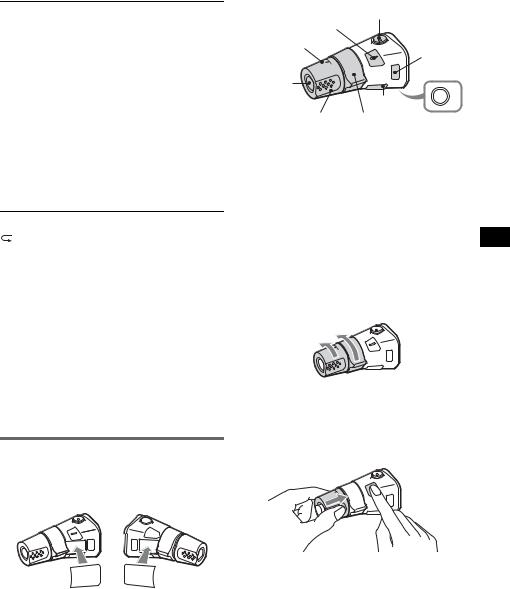
Skipping albums and discs
1During playback, press (1)/(2) (GP/ALBM –/+).
To skip |
Press (1)/(2) (GP/ALBM |
|
–/+) |
||
|
||
|
|
|
album |
and release (hold for a |
|
|
moment). |
|
|
|
|
album |
within 2 seconds of first |
|
continuously |
releasing. |
|
|
|
|
discs |
repeatedly. |
|
|
|
|
discs |
then, press again within 2 |
|
continuously |
seconds and hold. |
|
|
|
Repeat and shuffle play
1During playback, press (3) (REP) or (4) (SHUF) repeatedly until the desired setting appears.
Select |
To play |
DISC*1 |
disc repeatedly. |
SHUF |
tracks in the changer in random |
CHANGER*1 |
order. |
SHUF ALL*2 |
tracks in all units in random |
|
order. |
|
|
*1 When one or more CD/MD changers are connected.
*2 When one or more CD changers, or two or more MD changers are connected.
To return to normal play mode, select “ OFF” or “SHUF OFF.”
OFF” or “SHUF OFF.”
Tip
“SHUF ALL” will not shuffle tracks between CD units and MD changers.
Rotary commander RM-X4S
Attaching the label
Attach the indication label depending on how you mount the rotary commander.
Location of controls
The corresponding buttons on the rotary commander control the same functions as those on this unit.
ATT |
|
SEL |
|
PRESET/ |
|
DISC |
MODE |
|
|
SOURCE |
|
DSPL |
OFF |
|
|
VOL SEEK/AMS |
OFF |
The following controls on the rotary commander require a different operation from the unit.
•PRESET/DISC control
The same as (1)/(2) (GP/ALBM –/+) on the unit (push in and rotate).
•VOL (volume) control
The same as the volume control dial on the unit (rotate).
•SEEK/AMS control
The same as (SEEK) –/+ on the unit (rotate, or rotate and hold).
Changing the operative direction
The operative direction of the controls is factoryset as shown below.
To increase

 To decrease
To decrease
If you need to mount the rotary commander on the right hand side of the steering column, you can reverse the operative direction.
1While pushing the VOL control, press and hold (SEL).
SEL MODE DSPL
DSPL MODE SEL
13
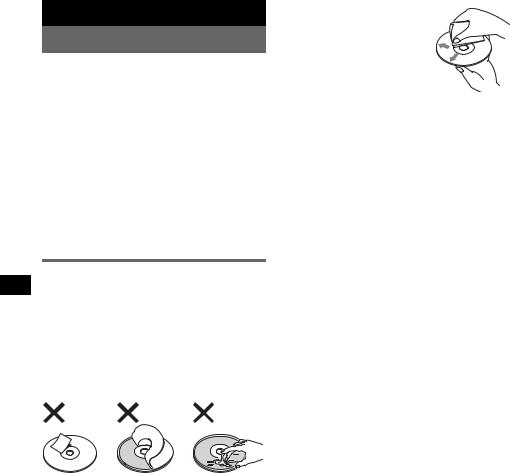
Additional Information
Precautions
•If your car has been parked in direct sunlight, allow the unit to cool off before operating it.
•Power antenna (aerial) will extend automatically while the unit is operating.
Moisture condensation
On a rainy day or in a very damp area, moisture condensation may occur inside the lenses and display of the unit. Should this occur, the unit will not operate properly. In such a case, remove the disc and wait for about an hour until the moisture has evaporated.
To maintain high sound quality
Be careful not to splash juice or other soft drinks onto the unit or discs.
Notes on discs
•To keep a disc clean, do not touch its surface. Handle the disc by its edge.
•Keep your discs in their cases or disc magazines when not in use.
•Do not subject discs to heat/high temperature. Avoid leaving them in a parked car or on a dashboard/rear tray.
•Do not attach labels, or use discs with sticky ink/ residue. Such discs may stop spinning when used, causing a malfunction, or may ruin the disc.
•Do not use any discs with labels or stickers attached.
The following malfunctions may result from using such discs:
–Inability to eject a disc (due to a label or sticker peeling off and jamming the eject mechanism).
–Inability to read audio data correctly (e.g., playback skipping, or no playback) due to heat shrinking of a sticker or label causing a disc to warp.
•Discs with non-standard shapes (e.g., heart, square, star) cannot be played on this unit. Attempting to do so may damage the unit. Do not use such discs.
•You cannot play 8 cm (3 1/4 in) CDs.
•Before playing, clean the discs with a commercially available cleaning cloth. Wipe each disc
from the center out. Do not use solvents such as benzine, thinner, commercially available cleaners, or antistatic spray intended for analog discs.
Notes on CD-R/CD-RW discs
•Some CD-Rs/CD-RWs (depending on the equipment used for its recording or the condition of the disc) may not play on this unit.
•You cannot play a CD-R/a CD-RW that is not finalized.
•The unit is compatible with the ISO 9660 level 1/ level 2 format, Joliet/Romeo in the expansion format, and Multi Session.
•The maximum number of:
–folders (albums): 150 (including root and empty folders).
–files (tracks) and folders contained in a disc: 300 (if a folder/file names contain many characters, this number may become less than 300).
–displayable characters for a folder/file name is 32 (Joliet), or 64 (Romeo).
•When the disc is recorded in Multi Session, only the first track of the first session format is recognized and played (any other format is skipped). The priority of the format is CD-DA, ATRAC CD and MP3/WMA/AAC.
–When the first track is a CD-DA, only CD-DA of the first session is played.
–When the first track is not a CD-DA, an ATRAC CD or MP3/WMA/AAC session is played. If the disc has no data in any of these formats, “NO MUSIC” is displayed.
Music discs encoded with copyright protection technologies
This product is designed to play back discs that conform to the Compact Disc (CD) standard. Recently, various music discs encoded with copyright protection technologies are marketed by some record companies. Please be aware that among those discs, there are some that do not conform to the CD standard and may not be playable by this product.
Note on DualDiscs
A DualDisc is a two sided disc product which mates DVD recorded material on one side with digital audio material on the other side. However, since the audio material side does not conform to the Compact Disc (CD) standard, playback on this product is not guaranteed.
14
